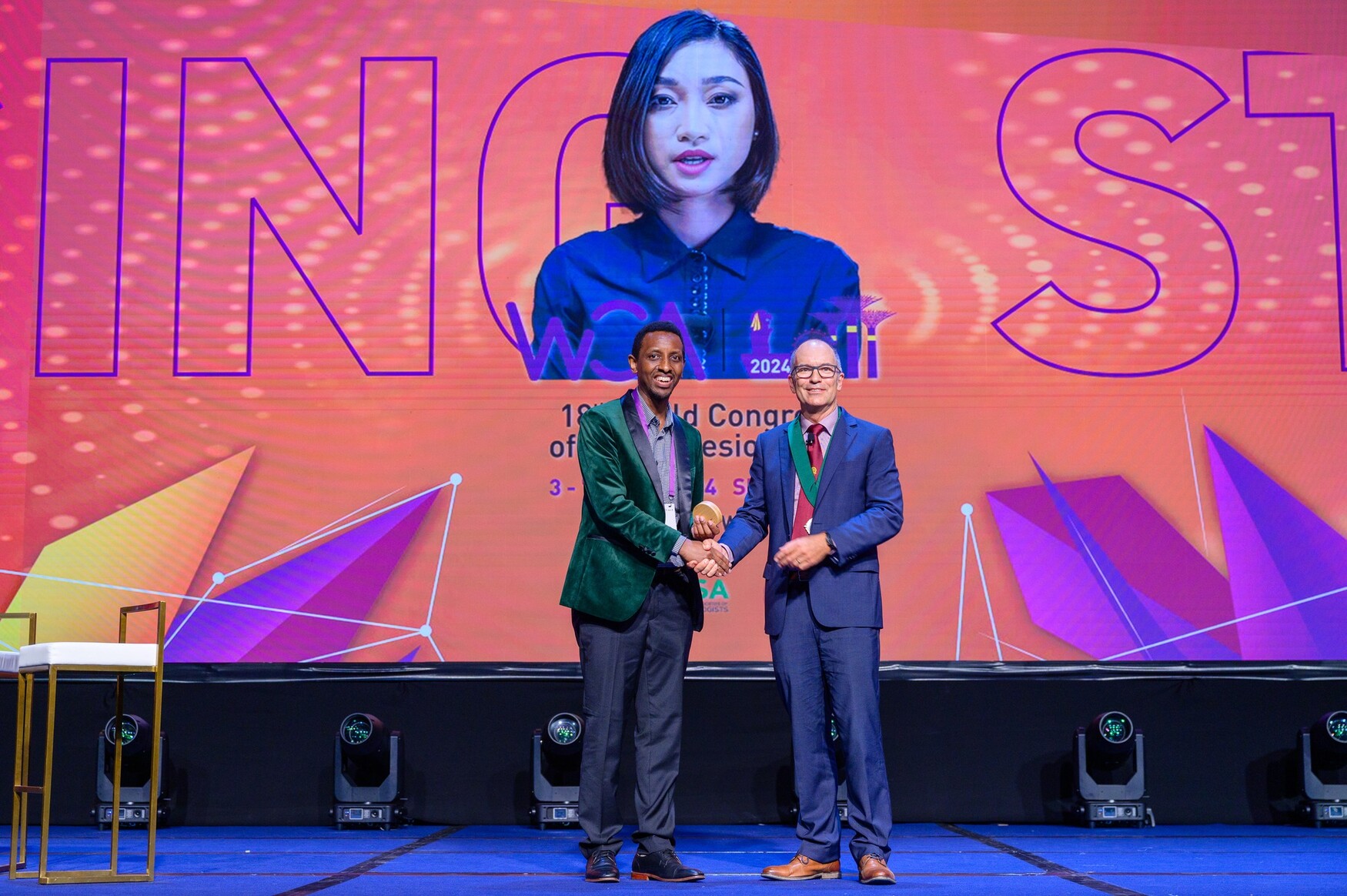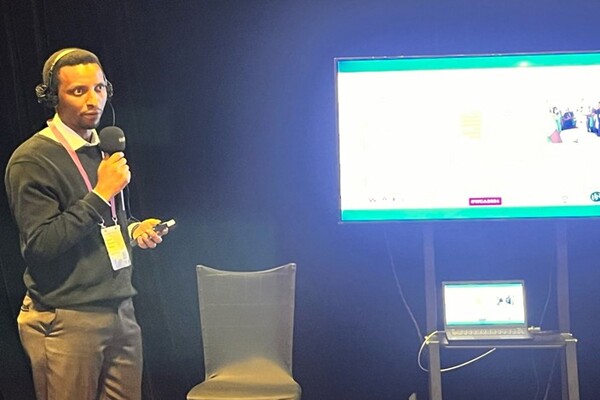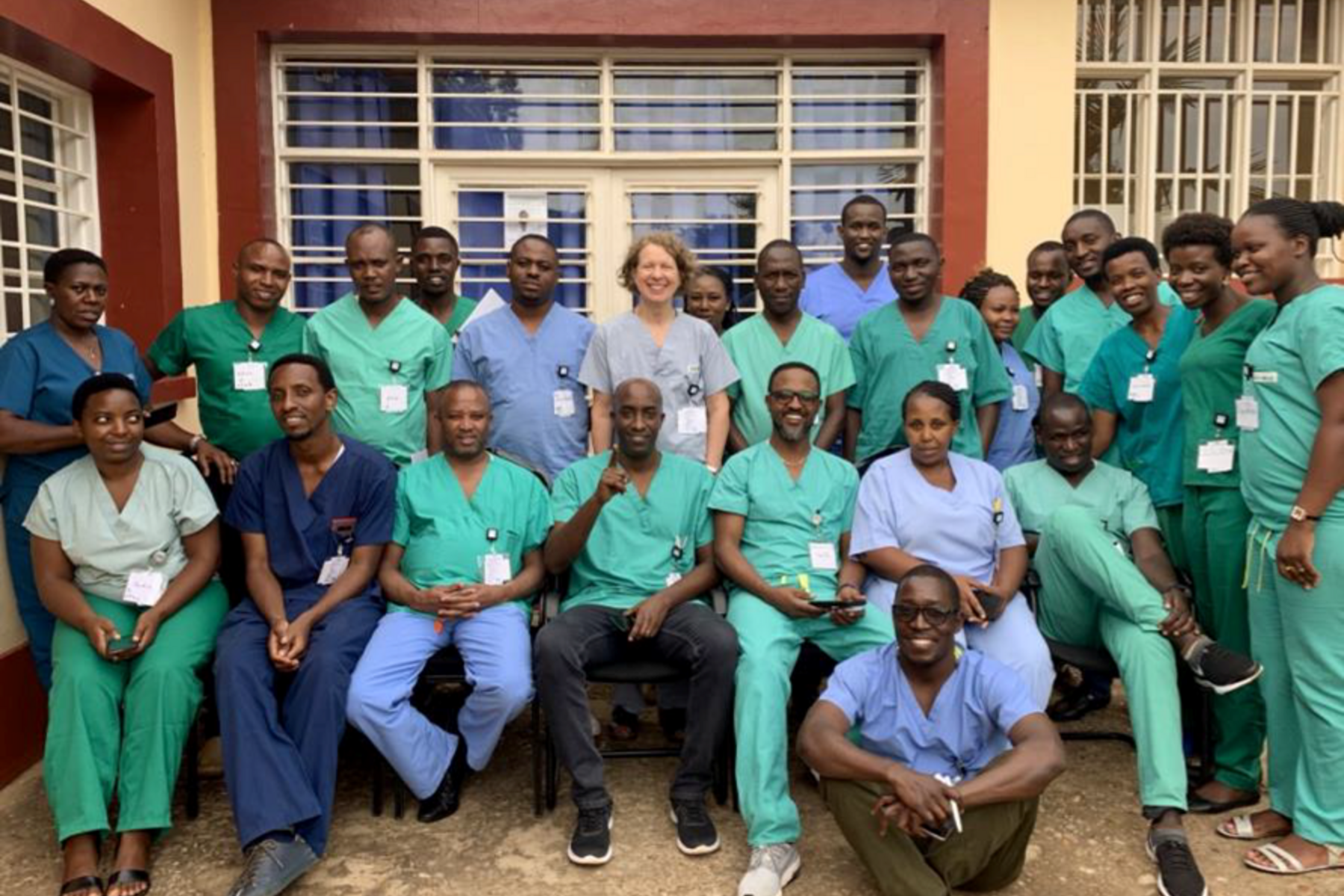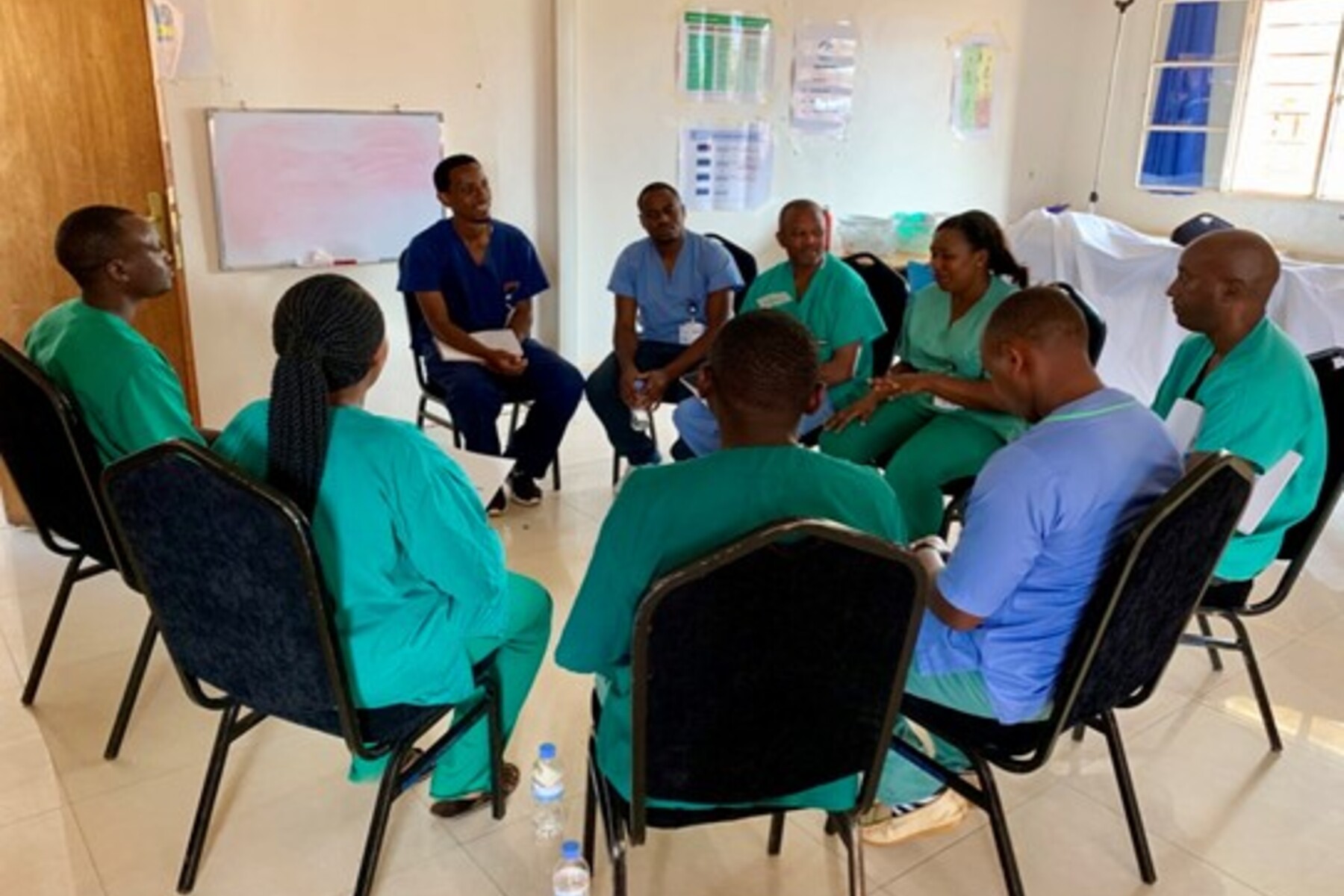Dr. Eugene Tuyishime Receives the WFSA Rising Star Award

Former Clinical Fellow in Perioperative Medicine and Ambulatory Anesthesia, University of Toronto ('21), Dr. Eugene Tuyishime, recently received the WFSA Rising Star Award in recognition for his contributions to safe anesthesia and resuscitation practice in Rwanda. We chatted with him on what the award means to him, his plans for the future, and any advice he has for young anesthesiologists.
What have you been up to since graduating medical school?
After graduating from medical school at the University of Rwanda, I completed my Master of Global Health Delivery from the University of Global Health Equity in May 2017, and at the same time, I was doing anesthesiology specialty training at the University of Rwanda until September 2019. Immediately after completing the anesthesia residency program, I joined the University of Rwanda as faculty of anesthesiology with a focus on research, global health, and perioperative medicine. During my initial 5 years working at the University of Rwanda, I had a leadership position as Assistant Program Director for Research, and I have completed sub-specialty fellowships in simulation and perioperative medicine from prestigious institutions in the USA (OhioHealth) and Canada (University of Toronto). I am currently an Obstetric Anesthesia Fellow at Western University, Canada, since August 2023, and Co-Founder and CEO of the Initiative for Medical Equity and Global Health (IMEGH), a teaching organization providing training and quality improvement projects for different hospitals in low-resource settings for the last 5 years.

How did it feel to be recognized by the WFSA with this award?
I felt incredibly honoured and deeply humbled to receive such a prestigious and global academic award recognizing my work in anesthesiology and global health. This acknowledgment serves as a powerful affirmation of the dedication and effort our team has shown while implementing different research, quality improvement, and continuous professional development projects.
This is not a personal achievement but also a testament to the collaborative efforts of different team members within the Initiative for Medical Equity and Global Health (IMEGH), my mentors, and partners who have contributed to this great achievement. I also felt grateful for the incredible support from my wife, Claudine Nyiramuhire, and my son, Anael Muhire Tuyishime, throughout the whole journey.
This award also reinforces my commitment to advancing equitable access to safe anesthesia in low-resource settings with a focus on Sub-Saharan Africa. It motivates me and my team to continue pushing boundaries, exploring innovative solutions, and securing new partnerships to make an even bigger impact. In addition, this award is an opportunity to showcase the good work and progress made by the Rwandan health sector and anesthesia specialty at a global stage. This may help open new doors for young anesthesiologists from low-income countries to get training and research opportunities through my growing network.
I am eager to leverage this recognition as a platform to contribute meaningfully to the field of anesthesiology and continue collaborating with colleagues worldwide, sharing insights, and driving positive change in healthcare systems and communities around the globe.
Can you go into more detail about the work you’ve done or any career highlights that you believe contributed to your recognition by the WFSA?
I received this prestigious WFSA Rising Star Award in recognition for my contributions to safe anesthesia and resuscitation practice in Rwanda, impacting numerous healthcare providers across various hospitals.
- Continuous professional development (CPD) courses and resuscitation capacity building across Rwanda: Through IMEGH courses, , a teaching organization I co-founded, I have conducted more than 31 training sessions of 5 courses (Basic Life Support, Advanced Cardiac Life Support, Pediatric Life Support, Vital Anesthesia Simulation Training, and Safe Anesthesia from Education Obstetrics), reaching 1,060 healthcare providers (anesthesiologists, non-physician anesthesia providers, general practitioners, nurses, midwives, obstetricians, and surgeons) from 11 district hospitals (see our publication here). We are now planning to expand our program to other hospitals in Rwanda and other countries, such as Botswana and Ghana.
- Research and quality improvement: I have conducted multiple funded research and quality improvement projects (more than 25 publications and 100,000 USD in funding in the last 5 years) with a focus on burnout among anesthesia providers, simulation-based resuscitation and team training, and the use of implementation science methods to improve the quality of perioperative care. For example, I led the implementation of different quality improvement initiatives for the early identification and management of high-risk obstetric and surgical patients. In addition, I created research mentorship opportunities for Rwandan residents, presented at multiple national and international conferences, and supported young anesthesiologists through the publication process. I am hoping to compete for bigger grants with a focus on building research capacity within the anesthesia community in Rwanda and other countries in Sub-Saharan Africa.
- Leadership and advocacy: I co-chaired the first standards of safe practice of anesthesia in Rwanda published by the Ministry of Health in 2022; this has the potential to improve the standards of anesthesia practice in Rwanda and to improve patient safety. In addition, I have led different advocacy efforts to raise awareness about the importance of improving workforce wellbeing, with a focus on healthcare providers working in Sub-Saharan Africa, especially the East African region. I have published different articles on burnout among anesthesia providers in Rwanda and East Africa. Moreover, I have written other advocacy papers focusing on improving residency training programs in Low and Middle Income Countries (LMICs) (see this example on training challenges for anesthesiologists) and quality of care (see this example on quality of maternal care in district hospitals) with the potential to make a positive impact on safer perioperative care in Rwanda and other low-resource settings.
What inspired you to pursue a career in anesthesiology, and how has your passion for the field evolved over time?
There is a huge disparity in access to safe surgical, obstetrical, and anesthesia care, with more than 5 billion people globally lacking access to surgical care.In Rwanda, anesthesia was not a popular speciality among medical students due to high levels of stress, insufficient mentorship, and poor job opportunities. I saw that as a big challenge but also a huge opportunity to focus on my efforts to encourage more medical students to join the speciality with the goal of making anesthesia safer with a positive impact on surgical and maternal outcomes. Our department has tried to address those challenges (see our publication here) and has made the anesthesia department a desirable department among medical students.
My passion changed towards global health and research as related to anesthesia and perioperative medicine because the challenges faced by anesthesiologists working in low-resource settings can’t only be addressed by clinical skills. Through global health practice, there is a chance to make a bigger impact through research, quality improvement, and advocacy when compared to the direct clinical care I provide to one individual patient. So far, I have written multiple advocacy papers (see this example on training challenges for anesthesiologists) and policy briefs (see this example on quality of maternal care in district hospitals) with the potential to make a positive impact towards safer perioperative care in Rwanda and other low-resource settings.
What advice would you offer to other young anesthesiologists who hope to have a significant impact in the field?
To answer this question, I will start with a short story about how our initiative started.
“When I was completing my anesthesia specialty training (between 2018 and 2019), it was common to see patients with complications referred from rural and small hospitals to our teaching centers. Sometimes, they would arrive in such critical conditions that it was too late to be able to save them, even if we had the knowledge, skills, and resources at our teaching center. I met with my colleagues to brainstorm how, despite limited resources, we can contribute to solving that problem. That is how the idea of founding IMEGH came about.”
I have been working with a talented and dedicated team for the last five years to make the IMEGH programs successful. I would like to thank the whole team: Dr. Alain Irakoze, Dr. Celestin Seneza, Mme Claudine Nyiramuhire, Dr. Jean Paul Mvukiyehe, Dr. Jackson Kwizera, Dr. Raban Dusabimana, Mr. Felix Nduhuye, and Mme. Ariane Girihirwe.
What I learned through that process is the importance of having the right team once you have identified the problem you want to solve. Now, we are at a crucial moment with many global health challenges (infectious diseases, non-communicable illnesses, maternal and child health, mental health, prevention of pandemics, access to drugs, equipment, and technology, etc.) that need dedicated individuals to champion health equity and social justice both locally and internationally. Young anesthesiologists have a great opportunity to have a career in global health on top of their regular clinical practice.
Even if it is challenging, a career in global health offers immense personal growth and fulfillment. It will challenge young anesthesiologists to confront their biases, expand their horizons, and discover the best version of themselves in service to others. And there is no better place to get global health opportunities working with internationally recognized experts than the University of Toronto.
I also say, “find your passion and your area of focus and join other global health experts to embark on this noble journey, not as mere bystanders but as passionate advocates, tireless champions, and fearless pioneers of global health.”
Throughout this journey, you will need support from family and friends, as well as to ensure your own wellbeing. Also, to be successful, you will be working with others as Paul Farmer, the founder of PIH and UGHE, said, “With rare exceptions, all of your most important achievements on this planet will come from working with others—or, in a word, partnership” in his book, To Repair the World.
So, find the right team and always act in the best interests of the people you will represent during the different stages of your leadership career.
I hope that you will consider pursuing a career in global health and that you will join our movement to improve the safety of anesthesia and surgery for vulnerable populations nationally and globally.
Can you share any mentors or role models who have influenced your journey in anesthesiology and how they have shaped your approach to the profession?
Throughout my career, I was lucky to have had great mentors and role models.
My key mentors include Prof. Dylan Bould, a pediatric anesthesiologist at the University of Ottawa and former President of the Canadian Anesthesiologist Society International Education Foundation (CASIEF); Prof. Ana Crawford, anesthesiologist and intensivist at Stanford University; and Prof. Paulin Ruhato Banguti, former Head of Anesthesia Department at the University of Rwanda. Through their mentorship, I managed to shape my career towards academic practice with a focus on global health research and leadership. They introduced me to different networking and career development opportunities. In addition, we have been collaborating on multiple research, education,and quality improvement projects, and advocacy initiatives across Rwanda.
I also have many role models, including the late Prof. Paul Farmer, co-founder of the University of Global Health Equity (UGHE) and Partners in Health, Prof. Patricia Livingston, former CASIEF lead for Rwanda, and Dr Adam Mossensson, founder of Vital Anesthesia Simulation Training (VAST), who have shown me the value of good partnerships in global health. Through the global health training from UGHE and different partnerships, I managed to implement multiple successful global health projects and grow professionally.
I learned that there are multiple ways to contribute to anesthesia safety beyond regular clinical practice through teaching, research, advocacy, guidelines development, etc.
Also, I would like to mention the importance of having a supportive supervisor and a great referee, Prof. Natalie Clavel, anesthesiologist from the University of Toronto and former Program Director for the Perioperative Medicine Fellowship, played an instrumental role by showing me how to be a supportive supervisor and wonderful referee. Now, I always try to be approachable and supportive of my junior colleagues and trainees.


Professionally, what’s next for you?
First, as an academic anesthesiologist and global health leader, I hope to contribute to better access to high-quality care in low-resource settings by advocating for investments to build world-class hospitals and pharmaceutical and biomedical equipment manufacturing facilities in low- and middle-income countries (LMICs) through public and private partnerships.
Second, I hope to establish a Global Health Centre at a high-ranking university, providing global health training for medical students, residents, and fellows, while collaborating with national and international organizations to develop projects aiming at improving access to safe anesthesia, surgery, and obstetric care in LMICs. I hope to also advise governments and non-profit organizations on the best strategies for improving equitable access to safe anesthesia, surgery, and obstetric care, especially in low-resource settings.
Third, I hope to contribute to global health policy, advocacy, and capacity-building efforts through different national (Ministry of Health, Professional Societies, NGOs) and international (World Health Organization (WHO) and the World Federation of Societies of Anaesthesiologists (WFSA)) organizations by serving on expert panels, contributing to guidelines development, and participating in task forces related to safe anesthesia, maternal care, perioperative medicine, better workforce wellbeing, and better training programs in low-resource settings. I hope to establish the Rwanda Obstetric Anesthesia Group, which will inform the design of policies and projects with the aim of reducing the maternal mortality to below 70/100,000 as a priority for the government.
Furthermore, through the IMEGH, I hope to raise enough funding for sustainable training and quality improvement projects with a focus on low-resource settings. In addition, our organization has the potential to establish different excellence centres for simulation and women’s care in the future as a way to reduce unacceptably high rates of maternal deaths in low-resource settings.
Through the above-mentioned activities, I hope that I will get promoted to associate professor within the next 3 years and to full professor in the next 6 years while making a positive impact in my area of interest both locally and internationally.
References
- Standards of safe anesthesia practice in Rwanda, MOH 2022. https://www.moh.gov.rw/index.php?eID=dumpFile&t=f&f=92531&token=98c1a4d3b0684f3b8a180a27631dfc56199c0bec
- Tuyishime, Eugene MD. Factors Influencing the Choice of Anesthesia as a Career by Undergraduates of the University of Rwanda. Anesthesia & Analgesia 125(6):p 2164, December 2017. | DOI: 10.1213/ANE.0000000000002481
- Eugene Tuyishime; Honorine Ingabire; Jean Paul Mvukiyehe, et al. Implementing the Risk Identification (RI) and Modified Early Obstetric Warning Signs (MEOWS) tool in district hospitals in Rwanda: A cross-sectional study. BMC Pregnancy and Childbirth. https://doi.org/10.1186/s12884-020-03187-1
- Eugene Tuyishime, Paulin Ruhato Banguti, Jean Paul Mvukiyehe, Faustin Ntirenganya, Marcel Durieux, Giles Cattermole, Using the World Society of Emergency Surgery (WSES) triage tool to evaluate timing of emergency surgery in Rwanda, World J Surg, DOI: 10.1007/s00268-020-05372-x
- Eugene Tuyishime, Alain Irakoze, Celestin Seneza, Bernice Fan, Jean Paul Mvukiyehe, Jackson Kwizera, Noah Rosenberg, Faye M Evans. The initiative for medical equity and global health (IMEGH) resuscitation training program: A model for resuscitation training courses in Africa, African Journal of Emergency Medicine, Volume 14, Issue 1, 2024, Pages 33-37, ISSN 2211-419X, https://doi.org/10.1016/j.afjem.2023.12.003
- Eugene Tuyishime, William F. Powell, Faye M. Evans; Anesthesiology Training in LMICs: Defining the Problem, Challenges, and Solutions. ASA Monitor 2021; 85:35–36 doi: https://doi.org/10.1097/01.ASM.0000795116.04062.61
- E. Tuyishime; J. P. Mvukiyehe; Vincent K. Cubaka et al. Improving post-delivery complications and quality of birth practice in district hospitals in Rwanda. Rw. Public Health Bul. 2020
- Tuyishime E, McIsaac DI, Mumbwe MC, Ruhato Banguti P, Mvukiyehe JP, Nzarora J, Bould MD. Burnout Syndrome Among Anesthesia Providers Working in Public Hospitals in Rwanda: A Cross-Sectional Survey. Anesth Analg. 2022 Oct 1;135(4):820-828. doi: 10.1213/ANE.0000000000006053. Epub 2022 Sep 15. PMID: 35452008.
- Workneh RS, Tuyishime E, Mumbwe M, Igaga EN, Bould MD. Not a "first world problem"-Care of the anesthetist in East and Southern Africa. Paediatr Anaesth. 2021 Jan;31(1):39-46. doi: 10.1111/pan.14054. Epub 2020 Nov 11. PMID: 33124109.
- Paul Farmer. To Repair the World: Paul Farmer Speaks to the Next Generation Volume 29
